 I'm going on the road again tomorrow, meaning I'll be spending hours of long and most of all a boring journey to the capital city. Can't really complain since running errands is one of many things we must do every now and then in our life, besides I think I can use a change of scenery for once in awhile.
I'm going on the road again tomorrow, meaning I'll be spending hours of long and most of all a boring journey to the capital city. Can't really complain since running errands is one of many things we must do every now and then in our life, besides I think I can use a change of scenery for once in awhile.Friday, April 10, 2009
Trēo is my entertainer on the journey
 I'm going on the road again tomorrow, meaning I'll be spending hours of long and most of all a boring journey to the capital city. Can't really complain since running errands is one of many things we must do every now and then in our life, besides I think I can use a change of scenery for once in awhile.
I'm going on the road again tomorrow, meaning I'll be spending hours of long and most of all a boring journey to the capital city. Can't really complain since running errands is one of many things we must do every now and then in our life, besides I think I can use a change of scenery for once in awhile.Thursday, April 9, 2009
Secrets for Android

- The main secrets list shows all of your secrets, ordered alphabetically by description. Each entry in the list shows the description, the Id or email address, and the time and/or date of the last action that was performed on that secret. Tap a secret to momentarily reveal its PIN. Tap and hold a secret to edit it.
- If your list of secrets is long, you can filter it by typing on the keyboard. Only those secrets whose description begins with the typed letters will appear in the list. Press BACK to clear the filter.
- Should Secrets be running when your phone goes to sleep, you will be automatically logged out. The next time your phone wakes up, you'll need to re-enter your master password to continue. Switching to another application and returning to Secrets will also require you to re-enter your master password.
Someone should inform Howard Stern about Classic PalmOS Emulator for the Prē
 I don’t really understand on why Palm put up a risk of promoting its most promising new device: the Prē™ by giving a private one-hour demo to the “shock jock” Howard Stern with the smartphone.
I don’t really understand on why Palm put up a risk of promoting its most promising new device: the Prē™ by giving a private one-hour demo to the “shock jock” Howard Stern with the smartphone.Sure, the big mouthed radio jockey superstar from Sirius XM Radio has his own appeal for talking straight forward on whatever he has in mind, and for that Palm got the opposite reaction from what the company was hoping for when they let Howard get personal with the Prē™.
The first tidal wave of excitement started when Palm's head of PR Lynn Fox called the people reps at Howard Stern show, either to make him talk about the Prē™ live on air or just to create a commotion among those who can’t get their hands on the Palm’s latest creation. It worked, the blogosphere was picking up on the news although it came only as a short statement from Howard:
"They're going to show me the Prē™ and then take it away. They're trying to build excitement for this thing. If people don't buy this I don't see how Palm keeps going," said Howard Stern.
It was enough to raised curiosities since there are scarce infos surrounding the Prē™, because there’s only a handful of people (we know of) who has actually held the device themselves. Another thing to worth waited for was because Howard is known as a long time and loyal user of Palm Trēo™, which at least tells us that he love to use mobile technology, a bit of geek like us: Palm-addicts. ;-)
But as we waited to hear good words to come out from Howard about the Prē™ like many reviewers did, Howard did the unexpected by saying the device is “very nice” but he rather choose BlackBerry Bold because he need Lotus Note support on his mobile device. Palm was definitely expecting promotional words of appraisal from him, but instead it turned into a free promotion for RIM, Palm’s very own competitor in mobile business.
That’s why they call Howard Stern as the “shock jock”, Palm just received a “shock” reality check from him.
Not that I want to poke fun at Howard Stern, but a man of his capacity as a superstar in his line of work, I found it hard to believe he still relies on Lotus Note. Wait, not that I’m saying Lotus Note is bad, it is good and reliable but nowadays it is all about ‘cloud computing’. From emails, chatting, browsing, twitting, social networking, etc. are all connected in the ‘cloud’. The best thing about ‘cloud computing’ is that you’ll never have to worry about losing your data when you lost your mobile device, or worry about compatibility issues when you’re switching to a new platform or new device.
You’re free in the ‘cloud’, and like what Palm CEO Ed Colligan has said about the Prē™ during its first introduction at CES 2009: “Lots of smartphone bring you the Internet -- but Prē™ does this without walls.”
But if Howard Stern chooses to keep on using the technologies that still work for him like 3rd app for accessing Lotus Notes on his Trēo™, then someone should inform him about MotionApps’ Classic PalmOS Emulator for the Prē™. An emulator that will allow the Prē™ to run legacy Palm OS apps, and according to MotionApp the maker: "Compared to Treo 700p, your PalmOS apps will run approximately twice as fast on Classic." That is not a surprise because the Prē™ has more power juice inside its slim body than the ol’ Trēo™ smartphones.
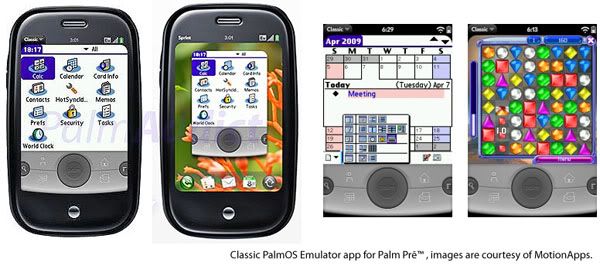
Inside the Classic emulator app there’s also the old HotSync feature, but it’s not going possible for the virtual PalmOS to synchronize with the Palm Desktop. Ed Hardy from BrightHand unearthed a secret about sync capability in Classic: “However, as I mentioned earlier, Palm OS software running in Classic will be able to access the Internet through the Pre. This means that it will be possible to indirectly sync calendar and contacts information. For example, the Pre will be able to automatically keep itself synchronized with Google' calendar and contacts; an app that syncs Google's data with the Palm OS equivalents would accomplish an indirect synchronization.”
Better yet, Howard should know that there will be plenty of apps written for Prē™ which let it sync with Lotus Notes. One for instance is CompanionLink software that Jennifer Chappell has reported at PreCentral.
- Palm chases biggest mouth (Howard Stern) for Pre word of mouth marketing (ZDNet)
- Closing the loop: Howard Stern picks BlackBerry Bold over Pre (ZDNet)
- Palm Gives Howard Stern Private Pre Demo (PalmInfocenter)
- Classic on the Pre: PalmOS Screenshots! (PreCentral)
- Howard Stern Chooses BlackBerry Bold Over Pre (PreCentral)
- MotionApps Classic Palm OS Emulator for Palm Pre Preview (BrightHand)
Tuesday, April 7, 2009
Where is Bono's true heart stay at?
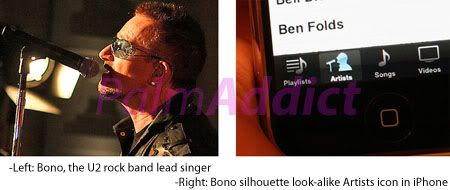 Bono, oh Bono... We know you're a famous rock star and one hella' rich guy who can buy big company like Palm, but you gotta watch what yer sayin' or otherwise you'll end up making enemies of bigger companies, let's say like Apple.
Bono, oh Bono... We know you're a famous rock star and one hella' rich guy who can buy big company like Palm, but you gotta watch what yer sayin' or otherwise you'll end up making enemies of bigger companies, let's say like Apple."Research In Motion is going to give us what Apple wouldn't -- access to their labs and their people so we can do something really spectacular."
Palm naming strategy for the Prē
 Palm Prē™.
Palm Prē™.For starters, the name is a short, single syllable, word that pairs very nicely with the Palm company name. And, of course, because it begins with a "P" it's alliterative. Palm Pre just rolls off the tongue.
In addition, it makes use of an accented "e", which is consistent with other products in the Palm portfolio, including the Treo (and the Foleo), which also makes use of an accented "e". The accent is also a really nice device for distinguishing the name visually in the market.
The messaging communicated in the name is intentionally broad in order to avoid pigeonholing and the suggestion of a specific *type* of phone (e.g. text phone, music phone, camera phone, etc). General associations with setting a new PREcedent, and the implication of things to come were of course intentional. You get a bit of redefining what it means to be a smartphone. And maybe you get a little speed and efficiency from the name if you're taken to Prix as in Grand Prix.
Lastly, and this is really important, the name doesn't try to out "cool" all the other phones in the space. It's not a "Dare" or a "Decoy" or a "Sway" or a "Juke" or a "Mirage" or whatever. Pre is more understated and allows the phone itself to take center stage. And right it should, it's an amazing phone. You don't buy this phone because it sounds cool - you buy this phone because it IS cool!
Monday, April 6, 2009
Nokia's Ovi app store demonstrated at Web 2.0 Expo
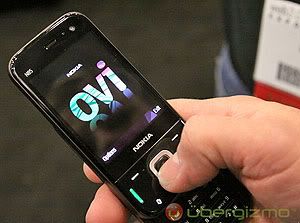 Even though Nokia is the biggest mobile phone maker in the world, the Finland-based company is yet to join in the party of selling apps with its own mobile on-line store: Ovi. There have been talks and rumors about Nokia's Ovi app store, but things are looking to materialized soon when Ubergizmo finally got a sneak peek of it at Web 2.0 Expo.
Even though Nokia is the biggest mobile phone maker in the world, the Finland-based company is yet to join in the party of selling apps with its own mobile on-line store: Ovi. There have been talks and rumors about Nokia's Ovi app store, but things are looking to materialized soon when Ubergizmo finally got a sneak peek of it at Web 2.0 Expo.An iPhone Prē-wannabe

- First off, download the Prē™ theme and the Live Weather icon to your computer.
- You're gonna either need to SSH into your phone or use DiskAid (this is easier)
- Open DiskAid and navigate to Root Folder > Library > Themes and copy the Palm Prē™ folder there.
- Go into your phone and open up Winterboard, select Prē™.
- Press the home button.
Sunday, April 5, 2009
Dev-Team: Unofficial QuickPWN kills Yellowsn0w, like forever
 Consider yourself warned before jumping into the bandwagon of sacrificing your iPhone, because most of you must have heard about the unofficial QuickPWN software for iPhone OS 3.0 Beta 2.
Consider yourself warned before jumping into the bandwagon of sacrificing your iPhone, because most of you must have heard about the unofficial QuickPWN software for iPhone OS 3.0 Beta 2."THE MOST IMPORTANT THING ABOUT THE UNOFFICIAL QUICKPWN RELEASES IS THAT IF YOU USE THEM, YOU WILL KILL YELLOWSN0W, POSSIBLY FOREVER."
Skype booming on iPhone: just a placebo effect?
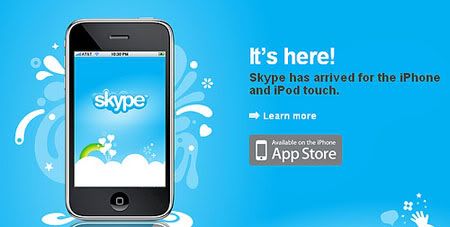
No, woman, no cry 3x
‘ere, little darlin, don’t shed no tears
Good friends we have, oh, good friends we’ve lost
Along the way
In this great future, you can’t forget your past;
So dry your tears, I seh:
No, woman, no cry 4x
As almost everybody tuned in to the latest episodes of American Idol, which one of the contestant performed Bob Marley’s song, that made me to dig up my old music collection and listen once more an addictive song with catchy phrase: No Woman No Cry. For me, the song resemble the current love-hate relations between AT&T (and any other wireless carriers for iPhone) with Skype. How so? Hear me out for awhile…
For the last week, there’s one particular app which became the headline in every tech blogs and especially on every iPhone news: Skype app. It was formally launched on App Store last Tuesday, and since then it has been downloaded 1 million times in less than two days, meaning Skype app was downloaded six times per second!
If there’s any doubt that users are yearning for making cheap calls using VoIP on iPhone, this is one solid proof to erase that doubt. "In less than two days, Skype for iPhone has been downloaded more than one million times -- around six downloads every second," the company wrote in a blog post.
But is Skype for iPhone really that good? Or is it just having a placebo effect from a booming popularity? Let’s find out.
A questionable restriction
The users may rejoice for the arrival of Skype on iPhone, but it’s the other way around situation for wireless carriers who exclusively support the iPhone on their networks. As a matter of fact, they are now forced to see what the future of wireless service will be: cheaper calls with VoIP. If Skype is only the beginning of the new wave, then wireless carriers is looking to change their business model from offering phone service to selling data service. Right now their main revenue comes from the phone service, and the data service is seen as only additional income.
So to protect their core of business model, AT&T (together with Apple) put a restriction on iPhone that VoIP can only be made on WiFi connection. Quickly enough, the restriction raises plenty of complaints and criticism, plenty enough for an advocacy group called Free Press who on Friday called the Federal Communications Commission (FCC) that such restriction is another violation of consumer’s right to access broadband internet. The open letter to FCC is referring to FCC's Internet Policy Statement that stated "consumers are entitled to run applications and use services of their choice" in order to "preserve and promote the open and interconnected nature of the public Internet."
But according to Jim Cicconi, AT&T's top public policy executive who was interviewed by USA Today says AT&T has “every right” not to promote competitor’s service: "Skype is a competitor, just like Verizon or Sprint or T-Mobile. Skype has no obligation to market AT&T services. Why should the reverse be true?” Cicconi then added: “We absolutely expect our vendors (Apple, in this case) not to facilitate the services of our competitors.”
AT&T recognizes Skype as a competitor, and if we see the rates offered by both company then you know why AT&T is afraid of Skype: an average Skype call to landlines costs you 2.1 cents per minute, while AT&T charges 35-45 cents per minute for each additional minute spent outside your voice plan. Compare them yourself by seeing these Skype’s and AT&T’s call rates.
Even worse in Germany, Deutsche Telekom (who own T-Mobile and T-Com) has declared plan to ban the use of the Skype app on both its 3G network and its extensive Wi-Fi hot spot network, further more they will cancel the contracts of any users who use workarounds to run the program anyway. Deutsche Telekom‘s reason is that the VoIP app uses too much of high data which will choke the network infrastructure, and most of all that the use of VoIP violates the customer contract.
Immediately, the Voice on the Net coalition, which includes Skype, (also Microsoft and Intel), has asked the European Union to look over at Deutsche Telekom‘s restriction policy and help protect consumers rights to choose freely what applications they want to use.
"Technical concerns have no grounds," Skype's general counsel Robert Miller told Financial Times. "It's much more about competition," he added. And the Skype’s general counsel puts in more weight in the company’s blog by saying: "They pretend that their action has to do with technical concerns: this is baseless. Skype works perfectly well on iPhone, as hundreds of thousands of people globally can already readily attest."
It’s a real pity for iPhone users in German, since Skype app has already sit at the top free app on the German App Store. And as for those who are in the U.S. there are more other things to worry about, like tax…
Taxable VoIP service
Although AT&T is limiting the use of VoIP only with WiFi connection, in the U.S. both Verizon and T-Mobile allow VoIP service like Skype to run on their cellular networks. For now that’s a relieving good news for mobile users there, but that may change when U.S. lawmakers are beginning to question the needs to collect tax on the VoIP service.
Members of the House of Representatives Judiciary Committee's commercial and administrative law subcommittee on Tuesday expressed concern that some VoIP services could escape state or local taxes because of the mobility of VoIP equipment.
Cole and John Barnes, director of product management and development for Verizon Business, asked the lawmakers to include VoIP in a law governing how mobile-phone service is taxed. "The technology has simply outpaced the rules that apply to taxation for telephone services," Barnes said. "A new system is needed to determine state and local taxation for VoIP services."
The cheap solution for making calls will become not so cheap anymore once it’s being taxed, when this become a reality then the wireless carriers will be the ones who rejoice, not users.
What’s Skype real use for iPhone users?
Here’s a really down-to-core and yet intriguing question about Skype for iPhone: “If you've already got an iPhone, what's the point of having an app to make a call?” As the name of the device itself says what its main purpose is for, and obviously it’s still easier to make calls with the old fashion way rather than launching an app first to do it.
And let’s not forget that if you’re allowed to launch Skype only on WiFi network, then you must find a hot-spot first before able to make a call. Thus decrease the whole meaning of being mobile by owning a mobile smartphone (cue goes to the roadwarriors).
That’s one way to argue why you put Skype app into your iPhone, but the true power of the app comes when you take the device to a broader territory. Let’s say you’re out of town and wish to make a call to your mom, telling her how much you love her (awww…. ;-p), then using VoIP is a no-brainer more cheaper way than the carrier’s charge over the voice plan.
It gets better when you’re out of the country, outside your home country, where the cellular network is not available locally. Then VoIP like Skype will save a ton of cash, rather than buy a local SIM card just so your iPhone can have a decent reception to make calls. Ooops, and you’ll also need to unlock your iPhone to do that, meaning you’ll void its legal warranty.
All in all, Skype for iPhone holds many advantages and dis-advantages based on how you’re going to use it. The base line is, users should receive most of the advantages from VoIP service rather than not.
The onus is in the wireless carriers’ hands
Either AT&T or other wireless carriers acknowledge it or not, we all agree that VoIP will become a part of convergence mobile devices in the future that combines cutting-edge computing with portability. Verizon and T-Mobile have already allowed Skype in the U.S., so it’ll be only a matter of time where AT&T will be forced to follow the trend.
I like better on how David Coursey from PC World describes the future of VoIP in smartphones: “The appearance of Skype on wireless handsets will not change the world overnight. However, it will drag the wireless industry forward, even if there is some kicking-and-screaming involved.” That’s true, there will be a lot of fights from both camps: wireless carriers vs. users. But we already know how this will end…
On the other hand; Apple has yet to reveal their real opinion in public, but there are signs that tell the Cupertino-based company supports the use of full VoIP service on iPhone. Users who are trying to run Skype on cellular network with iPhone 2.x software will see the "call over 3G networks are not supported" message, although according to 9to5Mac report it can be done with the iPhone OS 3.0 software beta.
9to5Mac was able to make and receive VoIP calls over both AT&T's 3G and EDGE cellular networks. While ComputerWorld blogger Seth Weintraub tried the Skype app too and said that the call quality easily exceeds a regular voice call. These tell us that Apple is not limiting VoIP, but instead they prepared more extensive use of the service. We’ll know for sure later in June, where Apple is also expected to present not just one but two refreshed iPhone models.
In the end, it is up to wireless carriers to decide whether to allow VoIP on the iPhone or not. Without doubt iPhone has become the most promising hardware sales revenue for almost every wireless carriers, especially for AT&T, but with this VoIP dilemma things could be different for them in not so distant future.
If you can’t beat ‘em, join ‘em… that the saying goes. And that’s what AT&T and Deutsche Telekom should do, otherwise they’ll soon singin’ the above Bob Marley’s song lyric but with the “woman” word changed into “iPhone”. ~LOL~
Sources are from:
- Skype for iPhone tops 1M downloads in two days (ZDNet)
- FCC pressed on iPhone Skype, tethering apps (CNet)
- FCC Asked to Investigate Skype for iPhone Restriction (PC World)
- T-Mobile Germany Banning Skype for iPhone (PC World)
- Lawmakers: Let's Be Sure We're Collecting VoIP Tax (PC World)
- Skype for iPhone: What's the point? (iPhone Atlas)
- Mobile Skype: The End of Cellular As We Know It (And I Feel Fine) (PCW Business Center)
- Showdown: Carriers threaten to ban Skype from cellular networks (TG Daily)
Wednesday, April 1, 2009
Android "Cupcake" new killer-features: wobbles & emoticons
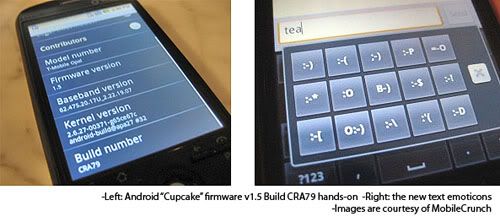
It seems not only Apple who is working on to make iPhone more perfect by adding in new features with OS 3.0, the Android team is also adding neat new little features in "Cupcake" latest build. As a matter of fact, one of the new features is native text emoticons which is only available in iPhone through third party apps (FrostyPlace & Big Keyboard Email). ;-p
The other notable new feature is the orientation switching animation whenever users change to/from landscape view, the new firmware is now more optimized with visibly "wobbles" zoom in-out. See it yourself in the embedded video below, and head on to MobileCrunch page to know the other little features.
BlackBerry App World is now open for business

Research In Motion (RIM) fulfill their promise to launch the highly anticipated BlackBerry App World today as planned, on April 1st. Funny enough, the launch date is right on time of "April Fools' Day". Thank goodness it's not a joke, otherwise it'll be one huge sick joke for CrackBerries all around the world.
According to BGR; the apps available right now are like Shazam, Bloomberg and a game called Brain Challenge 2. And the only way to make a purchase in App World is by using PayPal payment, but RIM is said to be working on other ways too.
An iPhone concept optimized for games

The iPhone has became a serious contender in the mobile gaming platform, challenging the already existed competition between Nintendo DS and the Sony PSP. This is shown how at this year Game Developer Conference (GDC) almost every game developers were expressing interest, and started developing games specifically to target the growing iPhone popularity. One of them is Ngmoco with its LiveFire game for iPhone OS 3.0, read about it at my previous post.
Although the iPhone itself is still mainly used for making & receiving calls, or the iPod Touch which shares the same software is used for listening music, thus hinder its capacity to compete with dedicated mobile device like the PSP. But what if Apple decided to put its famous wheel-click technology into the iPhone to make it more optimized for playing games?
This is what Olivier Demangel (via Ubergizmo) had in mind when he made an iPhone concept optimized for games -pictured above-, pretty awesome eh? I know, it's far from becoming a reality since Apple is unlikely to make an iPhone with sliding keyboard underneath its screen. But still, we're allowed to dream rite? ;-p
